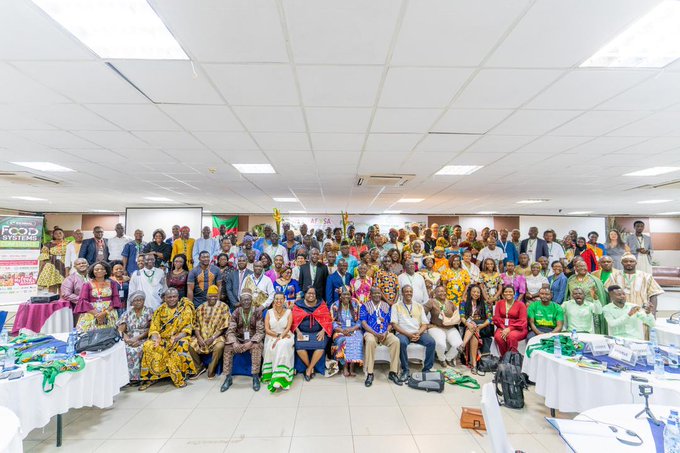|
Getting your Trinity Audio player ready...
|
Diverse actors from 30 countries call for a comprehensive Africa Food Policy that addresses Africa’s need to feed itself in the face of global uncertainty and climate change.
The social movements’ call came following the conclusion of the 4th Alliance for Food Sovereignty in Africa (AFSA) Biennial Food Systems Conference, which was held in Yaoundé, Cameroon, from November 28-30, 2022, under the title of “Mobilising African Food Policy and Action for Healthy Food Systems.” The conference brought together actors from over 30 countries and drew over 170 participants.
“The current conventional food system is flawed,” said AFSA Chair Dr. Chris Macoloo. “The food system based on the industrial agriculture narrative has failed to feed the world and Africa by generating toxic foods, polluting the environment, and fueling climate crises. By giving an Afrocentric roadmap to healthy diets and sustainable food systems, this conference provides hope and optimism for a much-needed alternative solution to food insecurity, mounting public health disorders, and the climate catastrophe.”
In recognition of the African Union’s Year of Nutrition 2022, this year’s conference highlighted novel approaches for learning and celebrating African food cultures, foods, diets, and cuisines to advance an African perspective on nutrition and food systems.
H.E. Gabriel MBAIROBE, Cameroon’s Minister of Agriculture and Rural Development delivered the official opening remark of the conference where he reminded the participants that “Africa’s food security is hugely impacted by the war in Ukraine and it is time for Africa to start looking for ideas and strategies to produce our food with lower prices that guarantee healthier, accessible and sustainable food”
The event also served as an official launch for the pan-African campaign “My Food Is African” which aims to inspire people in Africa to desire and demand traditional foods, dishes, diets and cuisines.
Dr. Million Belay, the general coordinator of AFSA, stated that “we are leaving in a period of increased unpredictability of new and emerging crisis, from the pandemic to war and climate catastrophes. Only if we invest in boosting our capacity to respond to various crises will Africans be able to survive and thrive. Agroecology is the best and most efficient way to build a food system that increases community resilience to climate change, provides healthy and sustainable diets, and protects the environment.”
The conference also marked the publication of the new book “My Food is African: Healthy Soil, Safe Foods, and Diverse Diets” as part of the “My Food is African” campaign. The book intends to spark people’s interest in learning about Africa’s unique, delicious, and healthy foods and cultures thereby fostering a safer, healthier, and more sustainable path to food sovereignty.
“African endogenous solutions are required to address the problems of food insecurity, hunger, and poverty on the continent,” stated Charles Mulozi, AFSA’s Advocacy and Campaign Coordinator. “Africa needs to start celebrating its vast diversity, which is reflected in its diverse cultures, languages, and cuisine. We cannot afford to rely solely on a few food crops, as this lowers the nutritional value of our diets, leaves our food system vulnerable to the climate crises and weakens our ability to adapt.”
At the end of the conference, AFSA members and participants call on African Union, African Governments and social movements around the world to:
#1: Calls on African Governments to become strategic partners in strengthening the institutional capacities of farming communities in their continued pursuit of economically and ecologically viable farming practices including agroecology that enhances increased food outputs, improves income for farmers and provides nutrition security for the local communities at low costs while delivering huge returns on investment, both socio-economic and for the environment.
#2: Urges African governments and channel funding towards agroecology which builds resilience in food systems in the event of unpredictable events such as the novel covid-19 pandemic, the war in Ukraine, the potential uprising in China, China’s war with Taiwan which holds food availability and food accessibility hostage in Africa;
#3: Calls on the African Union Commission (AUC) to anchor the development of the emerging Food Systems Policy anchored on of African’s diverse cultural foods and dishes and recognize their great value to people’s health and nutritional security;
#4: Call donor communities to direct funding towards upscaling My food is African campaign, aligning policies and programmes towards the transition to agroecology which supports the consumption of healthy and culturally appropriate food and increased investments in agroecological investments;
#5: Call on health experts, teachers, citizens, religious leaders, traditional leaders, institutions of learning, performing artists, media, fisher folks, pastoralists, MPs, state actors, academics, entrepreneurs, cooperatives, dieticians and consumer associations to join us in the movement to ensure more people embrace the consumption of healthy and culturally appropriate food through appropriate food policies.
Meanwhile, the Pan-African Parliament (PAP) led by Chief Fortune Charumbira has plans to hold a festival to celebrate African food.
“As the Pan African Parliament, we are planning some cultural food festivities in pursuit of promoting and advancing inter-cultural development, indigenous knowledge systems, and sustainable livelihoods through nutrition. There are plans to celebrate this culture during Africa month, which is in May 2023.
“As Africans, we are one. We are connected. This festival will help in unifying us and dispelling the colonial notions that we are different,” Chief Charumbira told Spiked Online Media.






